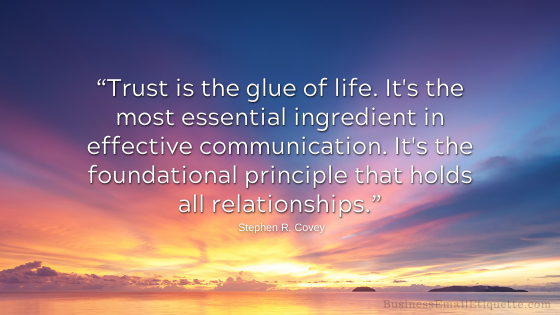Who Should You To: or Cc: in Business Email?

Have you ever wondered when to use the To: field versus the Cc: field in your business email communications? As with most things email etiquette, your discretion comes into play. (I know — I use that “d” word a lot.)
As a general guideline, you want to use the To: field when you want to address several contacts for the same reason as a group. When a name is included in the To: field, it indicates you are part of the discussion and your input is being solicited.
When to Use the Cc: Field vs. the To: Field
The Cc: field is generally used to keep others informed. When names are noted in the Cc: field, they are primarily kept in the loop (FYI). There is no expectation of a reply being required.
When you find your name in the Cc: field, know your input is welcome. If you have something important to add to the conversation that needs to be pointed out, do so.
However, in that case, reply only to the sender and do NOT hit Reply to All. The only time to Reply to All is if you are 100% confident that “All” need to see your reply. If you are unsure, reply only to the sender.
Cc: After the Fact?
One concern stressed by those who email me is the unfortunate situation of having an email conversation with one party who then takes the liberty of Cc’ing others on their reply or mid-way through the conversation.
For example, two managers discuss their respective teams’ responsibilities. Without notice, one of the managers then adds various staff members to the Cc: field after several back-and-forths.
Maybe the other manager wanted to keep the conversation between the two originally in the conversation. At least until details are finalized, this approach may prematurely expose their position on the situation.
Indeed, it is not a great way to build working relationships if one manager preempts the other. This can be perceived as a breach of confidentiality or undermining the other manager’s authority.
Think First = Discretion
Cc: must be used with discretion. Only Cc: those who really “need” to be in the loop on your ongoing communications. Only include those who are involved or impacted directly.
Especially when mixing internal and outside company contacts. Avoid exposing your employer’s business practices and methodologies. Those need to be protected and not exposed.
Cc’ing in the guise of customer service (or, worse yet, your attempt to CYA) can hurt your company and career. You don’t want to be seen as an eTattler.
Every email provides an opportunity to edit these contacts. Always review who is in the Cc: field and who you add before hitting Send to be sure the conversation is appropriate for all involved.
If unsure who should be Cc:’d, run it by your manager or supervisor first. If not transparent about what should be shared, ask.
Privacy and Confidentiality
Arbitrarily bringing others into a private conversation when the person on the other side may disagree with that choice can cause misunderstandings. It also leads them to doubt that they can communicate candidly with you.
If you feel the other party expects what you discuss is between you, honor that. It is the sign of a true professional to know intuitively when that is the case.
One thing is clear — you should never play politics with Cc:. Doing so is never a successful strategy and can lead to the perception that you are trivial and unprofessional.
The bottom line?
PRO TIP:
Discuss the topic at hand first with those already involved. Then, if you want to inform others about the outcome of that conversation start a new email that includes parties you want to bring into the conversation.
By following these tips, you’ll be known as a courteous and efficient communicator—more importantly, someone others can trust to use discretion when required.







